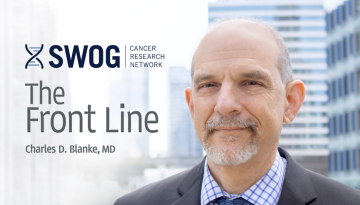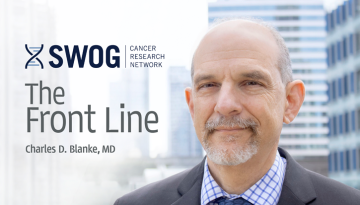Virtually Unforgettable: Group Meeting Recap
Another SWOG group meeting is on the books, our fourth held entirely virtually. Note recordings of all of the open sessions are now available online.
The biggest highlights of the meeting for me were our plenary sessions, and not just because plenary II gave me my semi-annual opportunity to wear my SWOG tie. We had a fabulous general plenary on integrity and ethical behavior in cancer research, with three outstanding presentations and a fascinating panel discussion. All of the material presented will help guide SWOG’s efforts in defining the role and goals for our new vice chair for diversity, equity, and inclusion, and will aid in defining our policies on professional behavior.
Plenary I included a pair of “gutsy” (their word, not mine) presentations on translational medicine in gastrointestinal tumors, insight into incorporating biomarkers into our immunotherapy trials, and a report on findings from Hope Impact Award-funded research on novel combination treatments for renal cancer. If you missed either plenary, you can still catch them online.
Last week’s sessions also included in-depth presentations of two of our recently opened trials – an update in the cancer care delivery committee session on the S1912CD CREDIT study, which is testing whether a financial education intervention can help reduce the financial burden of treatment for cancer patients and their spouse caregivers, and a kickoff event for the S2013 I-CHECKIT study, which is developing a model to predict which cancer patients are at greatest risk of immune-related adverse events from immune checkpoint inhibitors.
The patient advocate committee held a morning session largely devoted to an exploration of how advocates can best contribute to making the informed consent documents for our trials as simple, clear, and effective as possible. Their discussion will support the development of planned training, education, and additional tools.
Members of the SWOG Clinical Trials Partnerships (SWOG CTP) scientific advisory board were updated on work going on behind the scenes to build the infrastructure for conducting non-federal trials, including adoption of new integrated clinical trial management and electronic trial master file systems. Board members also got an overview of a number of platform study designs now in development (although no recording of this closed session is available, a recording of the SWOG CTP update forum is).
The VA committee session – its first as a full-fledged committee – included a discussion of potentially transitioning VA integration funding from The Hope Foundation, to develop additional VA “storefronts.” A storefront model lets VA sites that may not be able to reach accrual requirements individually band together to collectively meet those goals and participate in NCI trials. Our one current VA storefront has reached capacity, and more are needed to meet VA demand. Adding storefronts would allow increased collaboration across VA sites, improved efficiency for VAs opening NCI trials, and – most importantly – greater access for our veterans to trials of new treatments.
The Lung-MAP leadership held an executive retreat that included an update for NCI director Dr. Norman “Ned” Sharpless on the critical role of that master protocol within the NCI’s portfolio of clinical research.
The Hope Foundation’s board of directors also met last week, budgeting $3.2 million in grant support for 2022 and electing new leadership: Dr. Raymond Osarogiagbon replaces me as board chair (I will remain on the Hope board ex officio), Dr. Don Dizon replaces Dr. Lee Ellis as board vice chair, and David Gibson replaces Dr. Jimmy Rae as secretary.
Here are a few additional highlights from the meeting:
- Our lymphoma committee meeting included a mini-symposium on advances in the integration of bispecifics, epigenetic modifiers, and antibody-drug conjugates in treatment of the disease
- Our GU committee gave a fond sendoff to outgoing vice chair Dr. Nicholas Vogelzang and welcomed new vice chair Dr. Daniel Petrylak
- Our lung committee got an update on accrual to SWOG lung cancer trials over the past year, learning that in spite of COVID, accrual numbers have surpassed those from the three preceding years
- Our digital engagement committee saw the rollout of its first social media toolkit (for the S2013 I-CHECKIT trial), featuring sets of patient-directed and provider-directed tweets and graphics to promote the trial, along with a plain language summary of the study
- Our adolescent and young adult committee heard a highly informative presentation on breast cancer in AYA women from committee chair Dr. Becky Johnson
- Our radiation oncology committee session featured a keynote presentation from Dr. Sanjay Aneja on his lab’s use of machine learning and quantitative imaging, specifically in the context of analyzing data from clinical trials
Finally, earlier this week those of you who had registered for the group meeting should have received an email from my office with a link to a survey. Please visit the survey and give us feedback on your experience of the fall meeting. It’s the best way of ensuring our spring 2022 group meeting (Seattle, here we come) is even better.
Other Recent Stories



